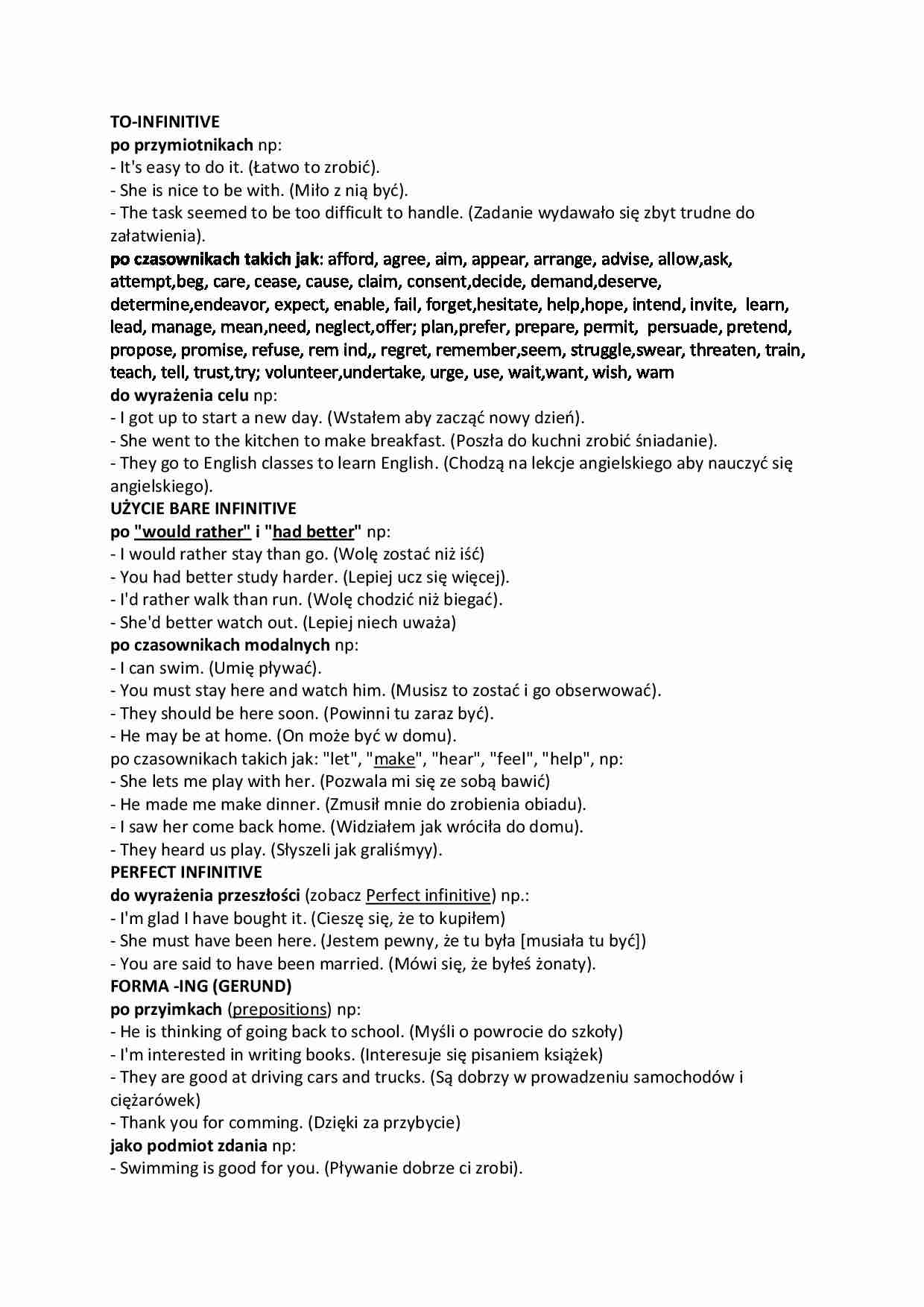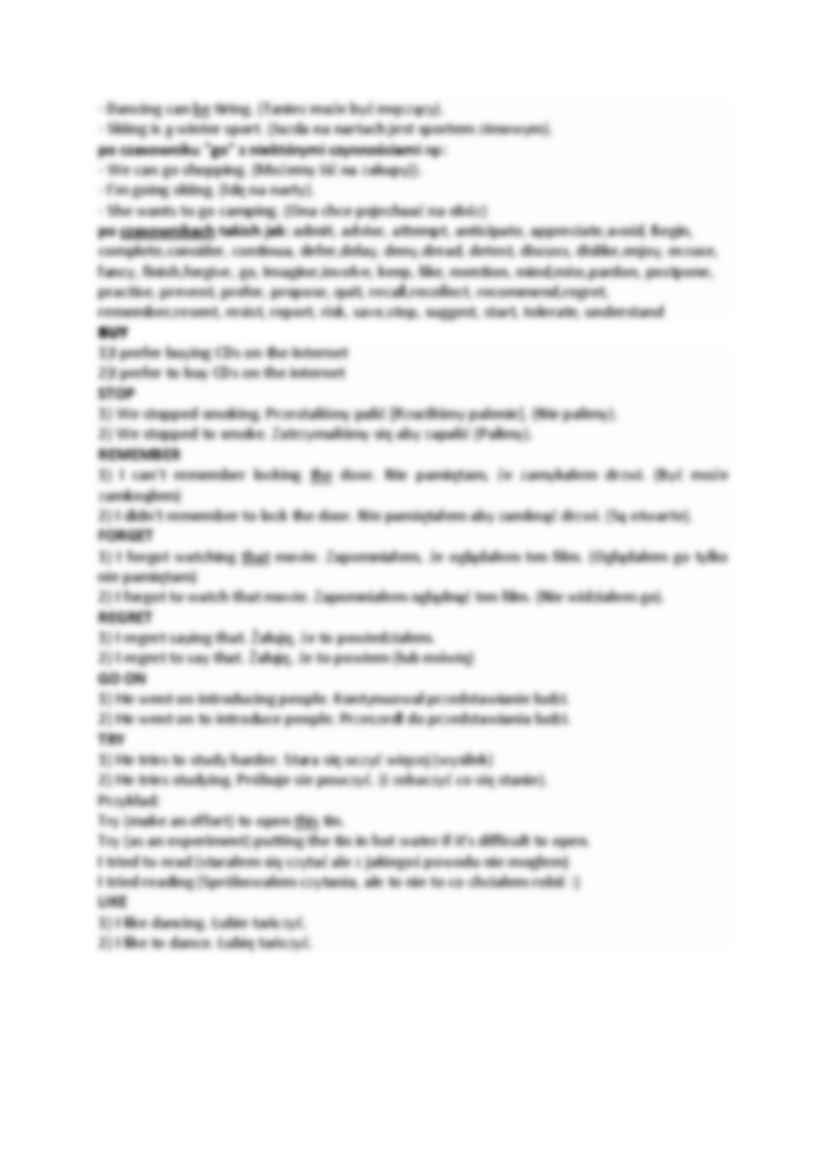TO-INFINITIVE po przymiotnikach np: - It's easy to do it. (Łatwo to zrobić). - She is nice to be with. (Miło z nią być). - The task seemed to be too difficult to handle. (Zadanie wydawało się zbyt trudne do załatwienia). po czasownikach takich jak : afford, agree, aim, appear, arrange, advise, allow,ask, attempt,beg, care, cease, cause, claim, consent,decide, demand,deserve, determine,endeavor, expect, enable, fail, forget,hesitate, help,hope, intend, invite, learn, lead, manage, mean,need, neglect,offer; plan,prefer, prepare, permit, persuade, pretend, propose, promise, refuse, rem ind,, regret, remember,seem, struggle,swear, threaten, train, teach, tell, trust,try; volunteer,undertake, urge, use, wait,want, wish, warn do wyrażenia celu np: - I got up to start a new day. (Wstałem aby zacząć nowy dzień). - She went to the kitchen to make breakfast. (Poszła do kuchni zrobić śniadanie). - They go to English classes to learn English. (Chodzą na lekcje angielskiego aby nauczyć się angielskiego). Użycie Bare Infinitive po "would rather" i " had better " np: - I would rather stay than go. (Wolę zostać niż iść) - You had better study harder. (Lepiej ucz się więcej). - I'd rather walk than run. (Wolę chodzić niż biegać). - She'd better watch out. (Lepiej niech uważa) po czasownikach modalnych np: - I can swim. (Umię pływać). - You must stay here and watch him. (Musisz to zostać i go obserwować). - They should be here soon. (Powinni tu zaraz być). - He may be at home. (On może być w domu). po czasownikach takich jak: "let", " make ", "hear", "feel", "help", np: - She lets me play with her. (Pozwala mi się ze sobą bawić) - He made me make dinner. (Zmusił mnie do zrobienia obiadu). - I saw her come back home. (Widziałem jak wróciła do domu). - They heard us play. (Słyszeli jak graliśmyy). Perfect Infinitive do wyrażenia przeszłości (zobacz Perfect infinitive ) np.: - I'm glad I have bought it. (Cieszę się, że to kupiłem) - She must have been here. (Jestem pewny, że tu była [musiała tu być]) - You are said to have been married. (Mówi się, że byłeś żonaty). Forma -ing (Gerund) po przyimkach ( prepositions ) np: - He is thinking of going back to school. (Myśli o powrocie do szkoły) - I'm interested in writing books. (Interesuje się pisaniem książek) - They are good at driving cars and trucks. (Są dobrzy w prowadzeniu samochodów i ciężarówek) - Thank you for comming. (Dzięki za przybycie) jako podmiot zdania np: - Swimming is good for you. (Pływanie dobrze ci zrobi). - Dancing can be tiring. (Taniec maże być męczący). - Skiing is a winter sport. (Jazda na nartach jest sportem zimowym). po czasowniku "go" z niektórymi czynnościami np: - We can go shopping. (Możemy iść na zakupy)).
(…)
… jak: admit, advise, attempt, anticipate, appreciate,avoid, Begin, complete,consider, continua, defer,delay, deny,dread, detest, discuss, dislike,enjoy, excuse, fancy, finish,forgive, go, Imagine,involve, keep, like, mention, mind,miss,pardon, postpone, practise, prevent, prefer, propose, quit, recall,recollect, recommend,regret, remember,resent, resist, report, risk, save,stop, suggest, start, tolerate, understand
BUY
1)I prefer buying CDs on the Internet
2)I prefer to buy CDs on the internet
STOP
1) We stopped smoking. Przestaliśmy palić [Rzuciliśmy palenie]. (Nie palimy).
2) We stopped to smoke. Zatrzymaliśmy się aby zapalić (Palimy).
REMEMBER
1) I can't remember locking the door. Nie pamiętam, że zamykałem drzwi. (Być może zamknąłem)
2) I didn't remember to lock the door. Nie pamiętałem aby zamknąć drzwi. (Są otwarte).
FORGET
1) I forgot watching that movie. Zapomniałem, że oglądałem ten film. (Ogłądałem go tylko nie pamiętam)
2) I forgot to watch that movie. Zapomniałem oglądnąć ten film. (Nie widziałem go).
REGRET
1) I regret saying that. Żałuję, że to powiedziałem.
2) I regret to say that. Żałuję, że to powiem (lub mówię)
GO ON
1) He went on introducing people. Kontynuował przedstawianie ludzi…
... zobacz całą notatkę




Komentarze użytkowników (0)